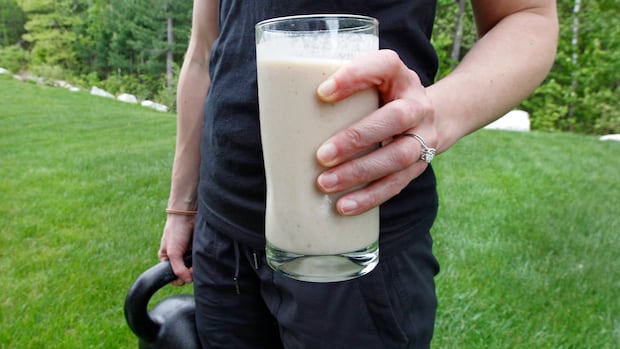Some protein powders and shakes tested by Consumer Reports contained levels of lead, a heavy metal, that experts say could raise the risk of long-term health problems. Scientists hired by Consumer Reports, an independent non-profit based out of the U.S., tested 23 popular protein products, and found lead levels ranging from zero to 7.7 micrograms per serving — above the stringent limits set by the state of California, but below U.S. Food and Drug Administration (FDA) standard for females of childbearing age. There is no safe level of lead for human consumption, though it finds its way into many foods because lead is present in the environment.Consumer Reports found most plant-based protein products it tested had elevated lead levels compared with animal-based products.The findings raise questions about the safety of taking the popular supplements frequently as well as how they are regulated in Canada, said Lawrence Goodridge, a professor of food safety at the University of Guelph. The findingsConsumer Reports bought two or three samples of 23 protein products from New York stores or online retailers and had them tested at a lab for heavy metals, including lead.The products included dairy, beef, and plant-based protein supplements, such as protein powders and ready-to-drink protein shakes.Lead was the main heavy metal that emerged, the report said.”The worst products we tested had 7.7 micrograms of lead,” Paris Martineau, an investigative reporter with Consumer Reports, said in an interview. “That’s higher than the average American gets from everything they eat in a day. I do think that that’s a little striking.”Consumer Reports used California’s strict standard of 0.5 micrograms (µg) of lead per day for daily consumption. Some of the protein powders and shakes tested in the U.S. are available for Canadians to purchase online.”These products … that Canadians are using increasingly may contain very high levels of lead and that’s concerning,” Goodridge said.Lawrence Goodridge is a microbiologist at the University of Guelph. (Melanie Glanz/CBC)It’s not the first time that lead has been found in protein powders.The Canadian Food Inspection Agency says it has been monitoring toxic metals, including lead and cadmium, in protein powders since 2011. A 2018-2019 spot check of beverages showed protein powders had the highest average lead contamination among products tested, though Health Canada determined those levels were not a health risk to Canadians, the CFIA said.What does lead do to you?No amount of lead is considered safe in food, especially in susceptible populations, Goodridge said.The concern isn’t from a single, short-term use but long-term exposure, he explained. Lead builds up in the human body’s tissues and bones and can take decades to break down.Too much exposure to the metal can cause serious illness. In young children, it can impair neurological development. Adults who regularly consume products containing lead can face cognitive decline, mood disorders, chronic kidney disease and reproductive effects, Goodridge said. WATCH | No amount of lead is safe, expert says:Some top U.S. protein powders have high levels of lead: reportA new report from U.S. based Consumer Reports has identified high levels of lead in a number of market leaders for protein powder. The lead levels are most likely to cause health issues for people who consume the powders on a daily basis.Asked what consumers can do, Goodridge suggested:Eat food to meet your protein needs. Limit the use of protein powder to occasional and not daily consumption.Susceptible individuals such as children, those who are pregnant or at high risk because they are immunocompromised should avoid protein powders unless specifically prescribed by a health professional. Look for products that were independently tested. Dietitians generally advise people to get their protein from whole foods. Protein-rich foods are an alternative to protein powders for those looking to increase their intake. (Getty Images/iStockphoto)How is this regulated in Canada?The Canadian Food Inspection Agency said in an email that it is responsible for the surveillance of chemical residues in foods and how they follow Canadian regulations, while Health Canada sets the maximum level for environmental and industrial pollutants in food. However, it’s not clear whether these protein products are regulated as food or natural health products, and Health Canada could not respond to CBC’s questions by deadline.Goodridge wants to see Health Canada set guidelines for these protein powders or dietary supplements, he said.”There are no specific federal limits for lead in protein powders or dietary supplements,” Goodridge said. “This, in my opinion, is a big regulatory gap.”WATCH | Major chains add protein boosters to their menus:CBC’s Ian Hanomansing speaks with registered dietitian, Nicole FetterlyCBC’s Ian Hanomansing speaks with registered dietitian, Nicole FetterlyWays lead enters the productsLead is not permitted to be added to foods sold in Canada, Health Canada’s website notes.Since the metal is common in the environment, it is present in all foods, generally at very low levels, the department said. Lead can enter the food chain when plants take it up from the soil or through the air and settles on leaves and stems, particularly plants that are leafy or legumes such as pea, Goodridge said.Plant-based powders like pea, soy and rice concentrate the plant material, including lead, he said. What the product makers sayWhile Consumer Reports compared its findings to the state of California’s stringent standards, the companies who have commented said their products meet federal U.S. or European Union regulations for lead. Naked Nutrition’s said its Naked Vegan Mass Gainer was the only vegan product designed to help gain weight included in the Consumer Reports testing and has a significantly larger serving size. “When viewed on a per-gram basis, our results are consistent with other plant-based protein products,” James Clark, chief marketing officer, at Naked Nutrition, said in an email. Clark said when the company reviewed the available information and verified results through independent third-party testing, it “confirmed that no heavy metals exceeded FDA reference intake levels for adults, including for sensitive groups such as women of childbearing age.”Huel called the report alarmist and said its products, including Huel Black Edition, are not currently sold in Canada. The company said its product is a nutritionally complete meal.The magazine’s “approach reflects a uniquely cautious regulation rather than an internationally accepted measure of consumer safety,” Huel said in a statement.
Lead levels in protein powder, shakes flagged by Consumer Reports











